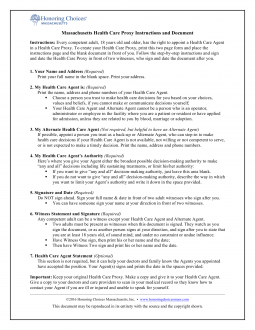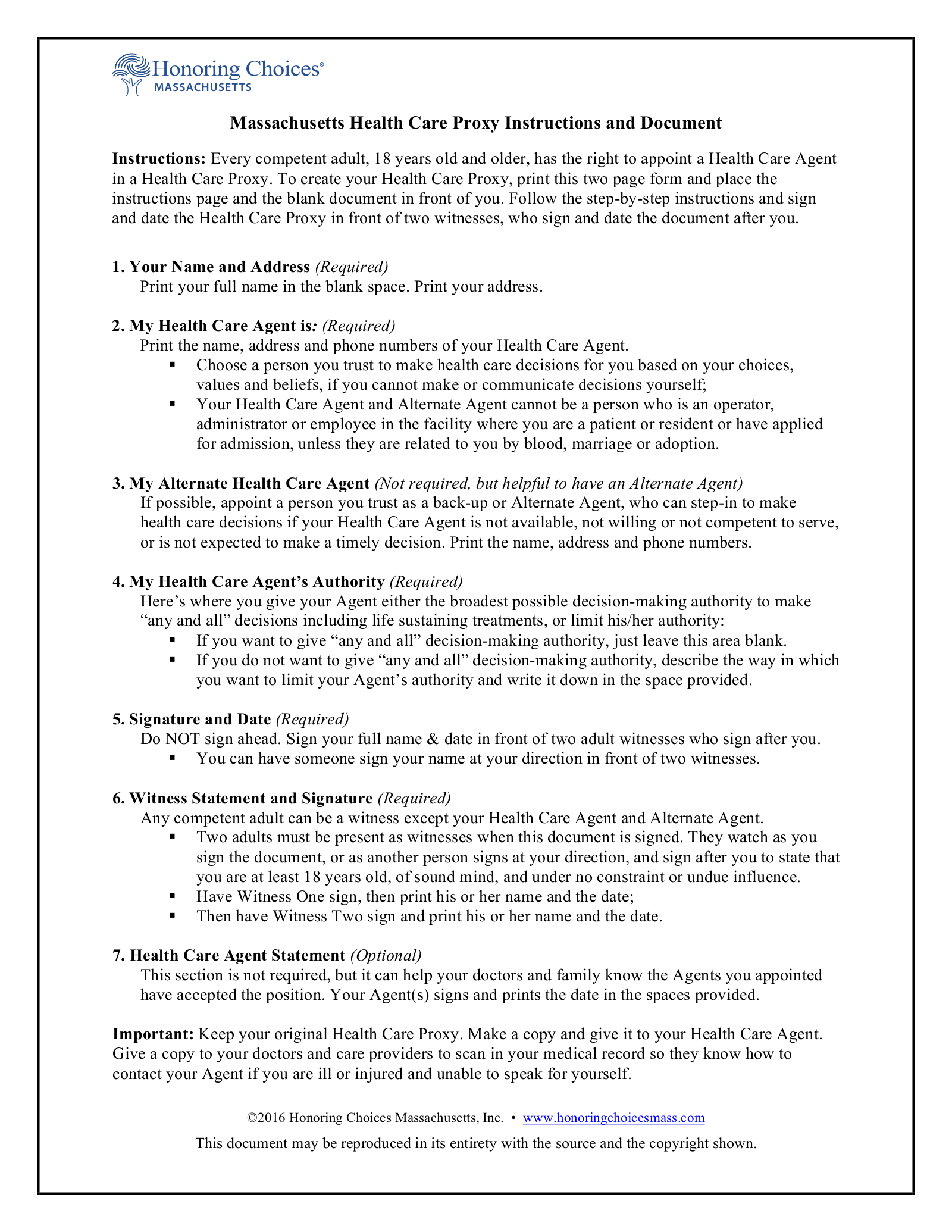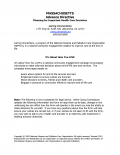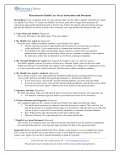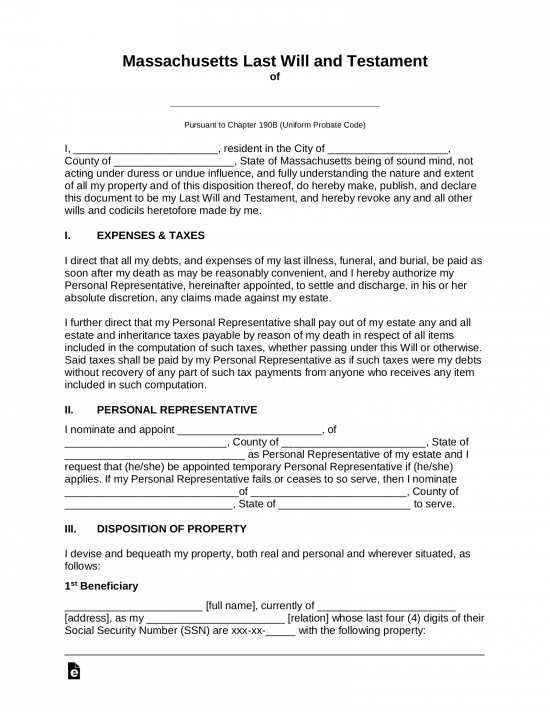Updated July 28, 2023
A Massachusetts advance directive is a document that allows a person to select an agent to carry out their health care wishes in case they become unable to speak or advocate for themselves. The document outlines a person’s medical preferences in the event they become permanently incapacitated. After completion, the form needs to be signed by the principal and at least two (2) witnesses to be legal.
Advance Directive Includes
Table of Contents |
Laws
Statute – GL Chapter 201D (Health Care Proxies)[1]
Signing Requirements – Two adult witnesses, none of whom are the agent.[2]
Versions (3)
Download: PDF
Download: PDF
Download: PDF
How to Write
Download: PDF
Massachusetts Health Care Proxy
(1) Massachusetts Health Care Principal. To issue an appointment of a Health Care Proxy in the State Of Massachusetts, you must present your name as the Principal making this appointment.
(2) Address Of Massachusetts Health Care Principal.

Health Care Agent Or Proxy
(3) Health Care Proxy For Massachusetts. The Agent who shall have the authority to inform Massachusetts Health Care Providers of your instructions for treatment when you can no longer communicate such directives effectively must be identified with a presentation of his or her name.
(4) Contacting Massachusetts Health Care Proxy.

Alternate Massachusetts Health Care Agent
(5) Alternate Agent To Proxy. As a precaution for ensuring that the Massachusetts Principal has a Health Care Proxy to provide Physicians in this state with the consented and denied treatments of the Principal eve when the Massachusetts Health Care Agent is unavailable when needed, unable to perform this role (i.e., revoked or traveling extensively), or refuses. A Reserve Agent or Alternate Health Care Agent can be named as a replacement should any of these scenarios occur. It should be mentioned that the principal authority this document grants will be appointed in a successive manner meaning that only one Health Care Agent will be given the ability to represent you (unless you specifically state otherwise in this paperwork). The Alternate Agent you name will thus not have any principal power unless the Massachusetts Health Care Agent does not or cannot fill the assigned role.
(6) Massachusetts Alternate Agent Contact.

Limits Or Instructions To Massachusetts Health Care Agent Powers
(7) Massachusetts Principal Instructions. If the potential Massachusetts Patient or Principal wishes to include a set of documented instructions with this appointment, this option is available through space in the fourth article. Generally, any instructions deliberately reported by the Massachusetts Principal will take precedence over his or her Health Care Agent’s power of representation. This means that any instructions will limit the Agent’s principal powers and any specifically stated restrictions on the Massachusetts Health Care Agent will prevent him or her from making decisions the Massachusetts Principal feels inappropriate for the Agent.

Signature And Date
(8) Massachusetts Health Care Agent Signature. The appointment made above will only be considered valid after the Massachusetts Health Care provides his or her signature before two Witnesses.
(9) Date Of Massachusetts Health Care Agent Signature.

Witness Statement And Signature
(10) Witness One’s Signature Area. The First Massachusetts Witness will take hold of the signed document then attest to the authenticity of the Massachusetts Principal’s signature by delivering his or her signature, printed name, and the current calendar date at the time of signing.
(11) Witness Two’s Signature Area. The next Witness must also fulfill his or her testimonial requirement by signing his or her name and printing it where requested then recording the current calendar date.

Health Care Agent Statement
(12) Signature Acceptance From Massachusetts Agent. The final article of this appointment is optional however strongly recommended. Here, the Massachusetts Health Care Agent can formally accept the responsibility appointed by signing the acceptance statement and documenting the signature date.
(13) Alternate Massachusetts Health Care Agent Signing. Similarly, it is suggested that the Alternate Health Care Agent’s signature acceptance and signature date are obtained.
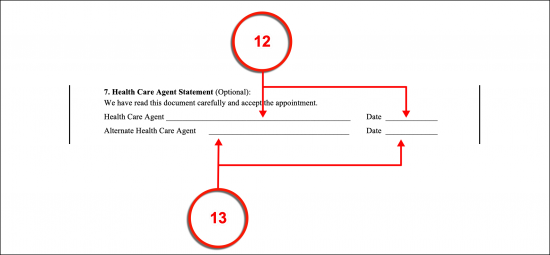
Massachusetts Medical Orders For Life-Sustaining Treatment
(14) Massachusetts Patient Name. The MOLST or the Medical Orders For Life-Sustaining Treatment in Massachusetts will have to be issued with the cooperation of a licensed Medical Professional. This document, while in effect, will be kept in the Massachusetts Patient’s medical files as a formal set of treatment instructions from the Massachusetts Medical Professional as requested by the Patient. Begin by identifying the Massachusetts Patient.
(15) Patient Date Of Birth.
(16) Medical Record Number If Applicable.
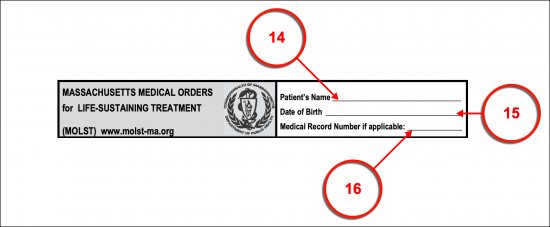
Directive A. Cardiopulmonary Resuscitation For A Patient In Cardiac Or Respiratory Arrest
(17) Instructions For CPR In Massachusetts. When a Patient’s heart or lungs stop functioning, immediate medical intervention is required to revive the Massachusetts Patient. First Responders and Medical Professionals with access to this document in the Patient’s medical files can refer to the first directive area where the Patient’s choice to issue refusal for CPR (cardiopulmonary resuscitation) from being administered or to deliver approval for this intervention will be displayed as with a checkmark in the appropriate box.

Directive B Ventilation For A Patient In Respiratory Distress
(18) Level Of Ventilation Treatment Required. If the Massachusetts Patient is unable to breathe, attending Medical Professionals will attempt to use any means legally accessible to ensure the delivery of oxygen. In a significant number of cases, a medical procedure where a tube is physically inserted (intubation) to the Patient’s airway to achieve the delivery of oxygen. The Massachusetts Patient can use the next section to refuse intubation, to approve of intubation, to deny non-invasive ventilation (such as an oxygen mask), or to approve of non-invasive ventilation procedures.

Directive C Transfer To Hospital
(19) Instructions On Hospitalization In Massachusetts. When a Massachusetts Patient is suffering a medical event that requires hospitalization, his or her consent to hospitalization will be sought. He or she can deny admittance to a hospital unless it is needed for comfort care or pain management or consent to hospitalization in the State of Massachusetts by selecting one of the checkboxes in Directive C.

Directive D. Signing The MA MOLST
(20) Signature Party Status. While the Ma MOLST is two pages, both must be supplied with the means to identify the Massachusetts Patient as well as the proof needed to verify this document as his or her formal medical treatment requests. Before the signature area can be attended, the Signature Party must be identified. One of four checkboxes should be selected to indicate if the Issuing Party is the Massachusetts Patient, his or her Health Care Agent, Guardian, or Parent/Guardian of the Patient (who is a minor).

(21) Signature Of Patient Or Person Representing The Patient. This declaration requires the Issuing Party (whether it is the Massachusetts Patient or his or her Health Care Representative) to sign his or her name then follow with some supporting information.
(22) Date Of Signature.
(23) Legible Printed Name Of Signer. As a way to solidify the Signature Party’s identity, he or she must provide his or her printed name.
(24) Telephone Number Of Signer.
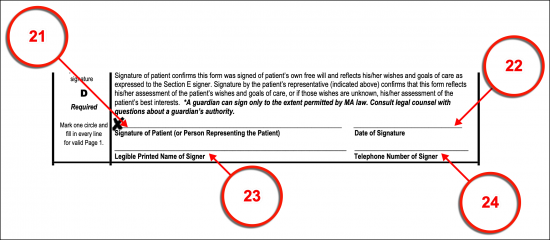
Directive E. Signature Of Medical Professional
(25) Signature Of Physician, Nurse Practitioner Or Physician Assistant. One of three types of Medical Professionals will be an acceptable Party to approve of the Patient’s treatment wishes. By signing his or her name the Massachusetts Physician, Nurse Practitioner, or Physician Assistant will be able to issue these requests as formal medical treatment instructions.
(26) Date And Time Of Signature.
(27) Legible Printed Name Of Signer.
(28) Telephone Number Of Signer. The Massachusetts Medical Professional should dispense the telephone number where he or she can be reached regarding the medical treatment orders being issued.
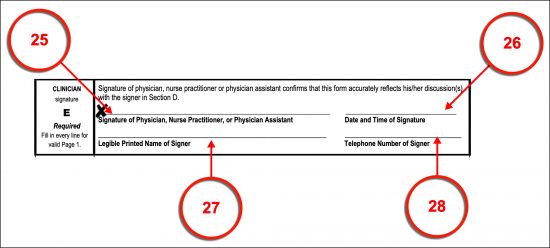
Optional Expiration To MOLST
(29) Instructed Expiration Date (If Any) Of This Form. Some Massachusetts Patients will express the desire that this document’s effective status naturally expire. If this is the case, then record the expiration date when the treatment orders in this MOLST cease becoming active (or effective).

(30) Health Care Agent Printed Name And Telephone Number. Massachusetts Medical Providers seeking to treat the concerned Patient may benefit from a record of the Patient’s Health Care Agent. Thus, an area where the Health Care Agent’s printed name and contact telephone number can be presented has been provided.
(31) Primary Care Provider Printed Name And Telephone Number.
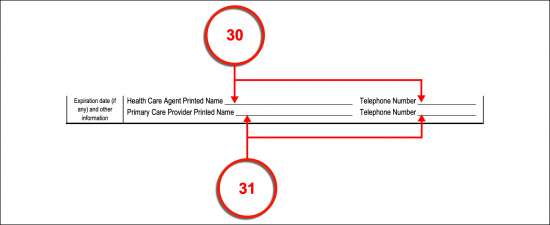
(32) Solidify Patient Of MA MOLST. The second page of the MOLST requires his or her full name, date of birth, and medical record number supplied at the top of the second page. If the Massachusetts Patient this document concerns does not have a medical record number, then this space can be left empty.

Directive F. Statement Of Patient Preferences For Other Medically Indicated Treatments
(33) Intubation And Ventilation. Some additional information regarding the Massachusetts Patient’s preferred medical treatment will be requested on the second page of this form beginning with his or her reported decision on intubation and other invasive ventilation procedures. By selecting one of the checkboxes in Directive F, the Patient’s decision can be referred to the previous report (see Directive B), insist that whatever intubation treatments were approved should only be administered for a limited amount of time, if the Patient is undecided, or if this topic was not discussed with the Patient.

(34) Non-Invasive Ventilation. On the subject of oxygen masks or other CPAP procedures, the Massachusetts Patient’s orders in Directive B can be recorded as verified or approved for a limited period of time. Additionally, two remaining choices will enable a report to present the Patient as undecided or if this topic was not covered with the Patient.

(35) Dialysis. The topic of dialysis treatments in Massachusetts can be covered by the MOLST. Choose one of the checkboxes from this topic in Directive F to establish that the Massachusetts Patient refuses dialysis treatments, approves of dialysis treatments, or will consent to dialysis but only for a short time. If none of these choices apply because the Massachusetts Patient is undecided or because this topic was not discussed, then two additional checkboxes will allow you to provide the Patient’s status on dialysis treatments as such.

(36) Artificial Nutrition. If the Massachusetts Patient has indicated that he or she will not approve of any nutrition delivered through an IV, a tube, or other artificial means, then use the “Artificial Nutrition” section in Directive F to present this decision, otherwise, it can be indicated that the Massachusetts Patient consents to the administration of medically delivered nutrition, consents to be artificially fed for a short period of time, remains undecided or if this subject was not discussed.

(37) Artificial Hydration. In addition to the subject of nutrition being delivered to the Massachusetts Patient through medical techniques, a similar discussion will be requested regarding the Patient’s level of consent to receiving water and fluids to remain hydrated using medical techniques such as an IV. The final checkbox area in Directive F allows the orders in this document to deliver the Patient’s refusal of artificial hydration, allow for it to be delivered as needed, only consent for a limited period of time, or whether the Patient remains undecided. A final choice allows a record that the Patient and Massachusetts Medical Professional did not discuss the topic of artificial hydration. Choose the checkbox that best defines the Massachusetts Patient’s standing on receiving water by tube, by an IV, or by other artificial delivery systems.

(38) Other Treatment Instructions For Massachusetts Physicians. Every directive, instruction, or Patient consent or denial of treatment that has not been discussed but should be included in the Physician orders for this Patient should be documented in the final area of Directive F. For instance, if the Massachusetts Patient has set a time limit to any consent to treatment listed above, then such a provision should be produced in this section.

Directive G. Patient Or Patient’s Representative Signature
(39) Signature Entity. The Massachusetts Patient, Health Care Agent, Court-Appointed Guardian, or Parent/Guardian who shall sign this document with the Medical Professional issuing these orders should be defined. Choose one of the checkboxes in Directive G to describe who will sign this form to verify its content is an accurate representation of the Massachusetts Patient’s medical treatment preferences when he or she is unable to communicate and suffering a medical event requiring the life-prolonging treatment discussed.
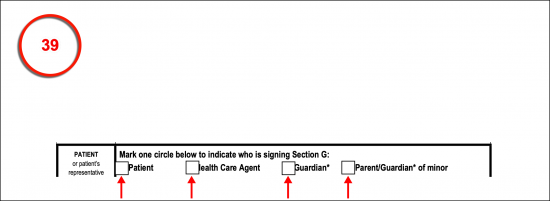
(40) Signature Of Patient Or Representative. The Massachusetts Patient or a Legal Representative of the Massachusetts Patient must sign this order.
(41) Date Of Signature.
(42) Legible Printed Name Of Signer. The Party who has signed this MOLST (as the Patient or Legal Representative of the Patient) must also print his or her name then continue to supply some contact information.
(43) Telephone Number Of Signer.
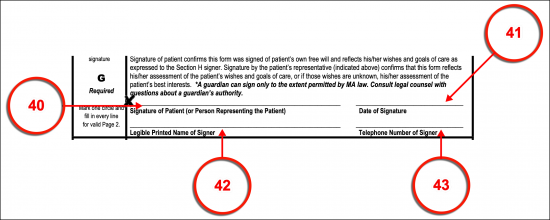
Directive H Clinician Signature
(44) Signature Of Physician, Nurse Practitioner, Or Physician Assistant. The Massachusetts Licensed Medical Professional working on the MA MOLST must sign his or her name. This must be a Physician, a Nurse Practitioner, or a Physician Assistant.
(45) Date And Time Of Signature.
(46) Legible Printed Name Of Signer.
(47) Telephone Number Of Signer. The Medical Practice or Private Practice where the Signature Medical Professional can be reached regarding these medical orders should be dispensed to fulfill his or her signature requirements.
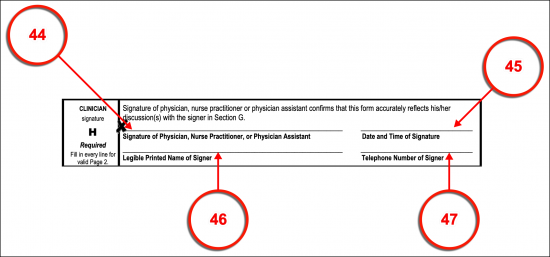
Personal Directive
(48) Massachusetts Declarant. The Massachusetts Principal and Patient of the previous forms can also issue a Personal Directive through this package. This conveys the exact medical preferences of the Declarant issuing it. To employ this form, report the full name of the Massachusetts Declarant or Patient along with his or her address to the first statement of declaration.
(49) Declarant’s Address.

My Personal Preferences, Thoughts, And Beliefs
(50) Declarant’s Health Care Agent Status. If the Massachusetts Declarant has appointed Health Care Agent or Proxy, this should be reported. Select the first checkbox and deliver the full name and contact information (address, phone number(s), email address) to the space provided. Otherwise, if no Agent or Proxy has been appointed with the principal power to make the Massachusetts Declarant’s medical preferences known, select the second checkbox statement of this area.

(51) Quality Of Life Directive. A definitive statement should be made regarding the Massachusetts Declarant’s preferred health care status. This report can list the priorities the Massachusetts Declarant places on his or her health, abilities, hobbies, financial goals, social interactions, and living situation.

(52) Concerns Over Being Fatally Ill. If there are any actions, procedures, or decisions that would aid the Massachusetts Patient while he or she is rendered unable to communicate while seriously injured or suffering a traumatic medical condition then present them in the fourth item. For instance, the Patient may be cognizant and completely paralyzed or prone to being only semi-conscious and believes that certain treatment or even environmental factors (i.e., music) will aid in his or her ability to cope can be discussed.

(53) Religious And Spiritual Beliefs. Any spiritual concerns or requests the Massachusetts Declarant wishes Reviewers of this document to observe when he or she is unable to speak or otherwise communicate during the end-stages of a terminal or fatal condition can be established and presented in the third item.

(54) Concerns Over Being Fatally Ill. If there are any actions, procedures, or decisions that would aid the Massachusetts Patient in coping with being rendered unable to communicate while seriously injured or suffering a traumatic medical condition then present them in the fourth item. For instance, the Patient may be cognizant and completely paralyzed or prone to being only semi-conscious and believes that certain treatment(s) or even environmental factors (i.e. music) will aid in his or her ability to find comfort when in such a condition.

(55) Quality Of Life When Terminally Ill. If the Massachusetts Patient has directions regarding life-support medical procedures when he or she has no chance of recovering from a fatal condition then, record them in the fifth item. Bear in mind, that even if these topics were covered in either of the previous forms in this package, they should still be documented in this declaration. This document will be given a higher priority because it is being completed by the Massachusetts Patient directly or under his or her direction as his or her declarations of acceptable and nonacceptable medical treatment.

(56) End-Of-Life Instructions. The Massachusetts Patient or Declarant can set his or her requests for whatever conditions he or she requires for a peaceful death to occur as the content of the sixth item.

III. My Medical Care: My Choices And Treatment Preferences
(57) Concerned Parties. When entering an end-of-life event, many people will wish certain Parties such as loved ones, spiritual leaders, or even attorneys to be informed. This task can be requested by listing each such Party’s name, address, phone number, and email address. If there is a specific instruction for one of these Concerned Parties, then this, too, should be documented.

Life-Sustaining Treatment In Massachusetts
(58) Current Medical Condition. It is strongly recommended that a detail of the Massachusetts Declarant’s current illnesses and medical conditions be presented to future Reviewers of this declaration

(59) Cardiopulmonary Resuscitation. This declaration will enable a reasonably easy way to define the Massachusetts Declarant’s instructions when he or she has suffered cardiopulmonary failure and requires CPR to live. One of the checkboxes from the list provided must be chosen to represent these wishes. In this way the Massachusetts Declarant can refuse CPR, consent to CPR only if he or she does not have an irreversible terminal condition or is in the end-stages of one, consent to CPR whenever necessary to revive him or her from cardiopulmonary failure or can appoint his or her Health Care Agent with the responsibility and power to make this decision when the time comes. Notice that some space has been provided if any additional directions should be given from the Massachusetts Declarant to Reviewing Physicians
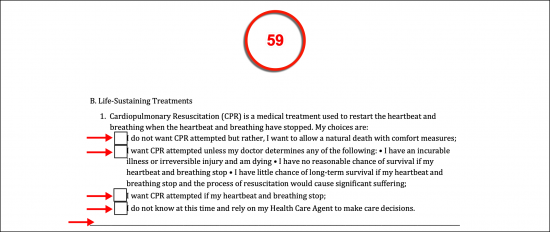
(60) Treatments To Prolong Life. The Massachusetts Declarant should review the statement directives made in the second item then select the checkbox that corresponds to the statement that best matches his or her decision on life-prolonging treatment. This will enable the Massachusetts Declarant to proclaim that he or she wishes to withhold or deny all life-support or prolonging procedures to experience a natural death, can consent to life-support procedures on a short-term basis (until the attending Physician and the Declarant’s Health Care Agent determine that no chance of recovery exists), can consent to receive all life-support procedures needed to prolong life, or document that his or her Health Care Agent should be expected to make this decision. Any directives left unmentioned should be documented in the space provided
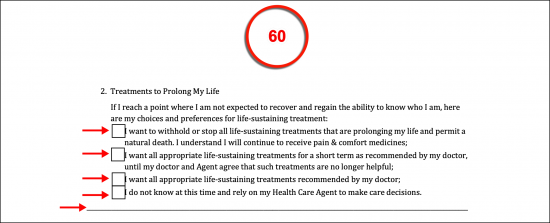
(61) Massachusetts Declarant Instructions. Any additional instructions that should be made by the Massachusetts Declarant to reviewing Medical Professionals should be set to paper in the fourth section.

Massachusetts Declarant Signature
(62) Massachusetts Declarant Signing. This paperwork requires the Massachusetts Declarant to sign his or her name in the fifth section.
(63) Date Of Signing. Massachusetts Declarant should fill the line adjacent to his or her signature with the current date.

(64) Reviewed And Reaffirmed. The Massachusetts Declarant is encouraged to review this document and confirm that its content still matches his or her medical preferences upon this future review. Naturally, this will require a signature and signature date on the part of the Massachusetts Declarant to confirm when he or she reviewed this declaration.
(65) Reaffirmation Signature Date.

Related Forms
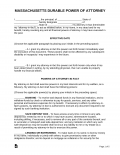 Durable (Financial) Power of Attorney
Durable (Financial) Power of Attorney
Download: PDF, MS Word, OpenDocument
Download: PDF, MS Word, OpenDocument

